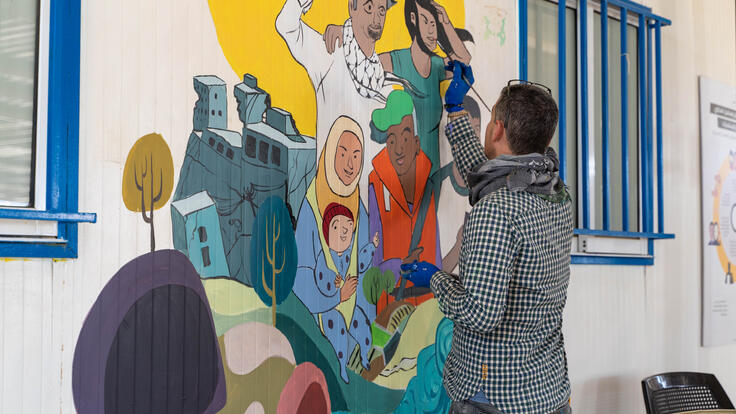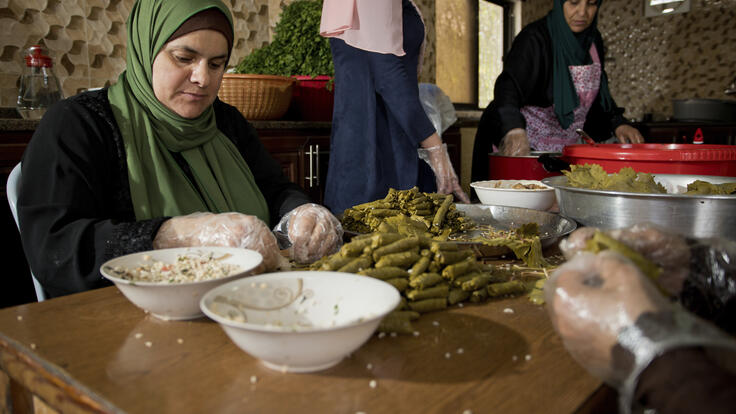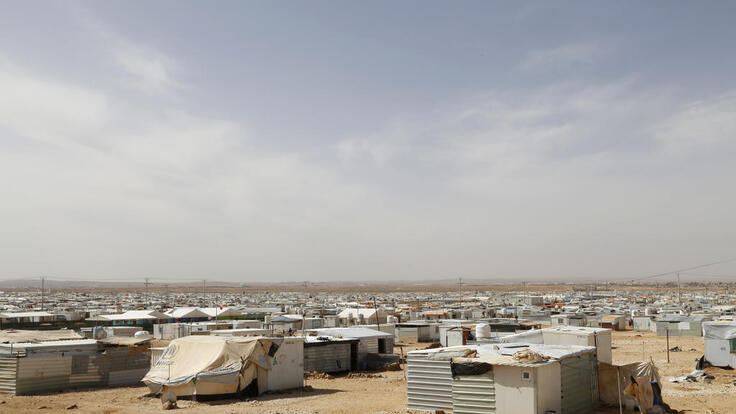Join us for 4 days/5 nights to see the International Rescue Committee’s (IRC) programs in Jordan and learn about the important work of IRC’s Amman-based Syria office.
ARRIVAL: January 7, 2024
DEPARTURE: January 12, 2024
Context
The International Rescue Committee began relief operations in Jordan in 2007 in response to an influx of Iraqi refugees.
Today, Jordan is home to millions of refugees from different conflicts. According to UNHCR's Global Trends report released in June, one in every 14 Jordanians is a refugee – Syrians, Palestinians, Iraqis, Sudanese, Somalis, Yemenis, and others. Most live in poverty, and over half are children with limited opportunities to learn and play.
THE IRC IN JORDAN
Today, the IRC helps both refugees and Jordanians in need to survive, recover, and regain control of their future. We provide an array of integrated services that improve the health, safety, and economic well-being of refugees and Jordanians. Since 2012, the IRC has reached over 670,000 clients at our community centers, clinics, and via mobile teams.
The IRC supports the right of people affected by crisis to participate in and shape the decisions that affect them. We seek to improve our communication with clients and responsiveness to their priorities, preferences, and feedback by increasing opportunities for clients to collaborate directly in shaping the services that they receive.
- We provide essential primary and sexual reproductive health care services, treat patients with non-communicable diseases, provide chronic disease management, and medication to patients in urban areas and two refugee camps (Za’atari & Azraq).
- The IRC provides health and protection services in a comprehensive approach and safe referrals between the IRC’s clinics and Women Protection and Empowerment (WPE) centers.
- We work with Ministry of Health on integrating refugees into the Jordanian Health System through institution building and system strengthening.
- Our centers in Irbid, Ramtha, Mafraq, East Amman, and Azraq camp provide lifesaving and empowerment support to the most vulnerable women and adolescents to counseling, Psycho-Social Support, life skills training, and most importantly, each other.
- Through male engagement and GBV awareness sessions, we target the root causes of domestic violence in homes and communities.
- We provide response and prevention services including quality comprehensive case management integrated with cash-for-protection services and outreach activities to ensure that women and adolescents live free from violence and are more empowered.
- The IRC business training and small business grants support livelihoods, while the additional income helps families avoid low-wage labor or having to send their children to work.
- Women and youth are gaining skills and boosting their income in our small business-training program.
- The IRC provides employment services in Mafraq, Irbid, Ramtha, and East Amman to boost the skills and work experience of women and youth through on-the-job training while providing them with a basic income through stipends.
- The IRC and Sesame Workshop joined forces in 2018 to restore hope and possibility for children in the world’s most conflicted region. The flagship Ahlan Simsim project extends its services beyond project life through the Smile Caravan. The Smile Caravan is a mobile unit that ensures children in Jordan have access to basic early childhood development tools that grow their social and emotional skills.
TENTATIVE ITINERARY
Day 1: Sunday, January 7
- Arrive in Amman, Jordan
- Overnight stay in Amman
Day 2: Monday, January 8
- Tour of the East Amman Community Center
- Introduction to Economic Recovery & Development (ERD) and Women’s Protection &
- Empowerment (WPE) Programs
- Attend livelihoods Bazaar to meet and purchase wares from IRC clients
- Observe health and early childhood development activities at the Smile Caravan
Day 3: Tuesday, January 9
- Visit the Za’atari Refugee Camp (90-min drive from Amman)
- Tour of the IRC Clinic followed by discussions with clients
- Presentation and meeting with the Amman-based IRC Syria team
Day 4: Wednesday, January 10
- Travel to Azraq (90-min drive from Amman)
- Tour of the Women’s Center in Azraq followed by discussions with clients
- Presentation and dinner with IRC’s Middle East and North Africa (MENA) Regional leadership team
Day 5: Thursday, January 11
- Travel to Irbid (one hour drive from Amman)
- Visit the Women’s Protection & Empowerment Center followed by discussions with clients
- Observe Economic Recovery & Development Programming followed by discussions with clients
- Farewell dinner and trip debrief
Day 6: Friday, January 12
- Depart for home
Trip Physical Intensity Rating
- Easy: Light walking. Programs accessible by land with reasonable driving distances.
- Moderate: Average level of physical exertion. Requires significant travel by land and/or air.
- Extreme: Physically demanding, extensive travel to visit programs by land, water and/or air.
FEE: $7,200 USD
THIS TRIP FEE COVERS:
- Three meals per day, accommodations, domestic air travel, road travel, permits and entrance fees
- Pre-departure support
- A donation to the IRC in Jordan
Please Note: Air travel to and from Jordan are not included in the above fee.
A non-refundable deposit of $2,000 is required to reserve a spot on this trip.

Muhammad, a refugee who fled the conflict in Syria in 2013 and settled in Zaatari camp in Jordan, paints a mural to celebrate World Refugee Day.

Three-year-old Jana has Down Syndrome and has benefited from the IRC’s ‘Reach Up and Learn’ program, where volunteers visit people’s homes and offer educational and emotional support to both children and their families.

Basima, 44 years from Damascus rolling vine leaves at a Home Cooking Business in Jordan.

Za’atari Refugee Camp
FAQ
Donor Delegation Trips are quarterly pre-planned, fee-based group trips of 5 to 10 participants to destinations prioritized based on funding needs and accessibility.
IRC puts forth the greatest possible effort to provide a safe and secure operational environment. However, given the nature of our work, participants on the trip may be exposed to healthcare risks, including but not limited to the risk of communicable diseases such as COVID-19. While IRC communicates and expects all operating partners to comply with and encourage appropriate safeguarding measures, the risk of COVID-19 and other potentially infectious diseases still exists. Visitors are required to review the medical guidelines that are provided by IRC prior to participating in the trip and to carefully consider them as they relate to your own medical profile and medical risk tolerance levels.
Yes, a spouse or partner is welcome to join you for this visit. Please register separately so that required forms may be completed by each individual participant.
IRC cannot host children on our program visits because our Safety and Security measures are not designed with children in mind, and cannot reasonably be adapted to ensure children’s safety.
After the visit, a trip summary, as well as photos and videos from the visit will be shared with all trip participants, which can then be shared with family, friends, and stakeholders of foundations and partners who were unable to join.
Immediately after you register, you will receive an email from the IRC's Program Visits team. This will be your primary contact for trip-related questions or concerns in advance of the visit. Before the visit, you will receive many resources to support your preparation process (see the response to the question below “Are there resources to help me prepare for the upcoming visit?”)
Trip registrants should assume that the itinerary shared with their invitation is the itinerary for their visit, for all intents and purposes. The itinerary is shared at this stage to help set expectations around the locations and program types to be seen, and the pace of the visit. Making changes to meet the interests of individual participants will make it impossible to set realistic expectations.
That said, the itinerary distributed with the invitation is tentative and subject to changes at any time due to circumstances out of our control, such as weather, politics or safety. The itinerary is designed by the hosting country and program teams based on accessibility of programs and priority of funding needs, with the objective of showing as many program highlights as possible.
We aim to avoid having idle time, ensure travel routes are safe and destinations are secure, and recommend flight arrival and departure windows to ensure the best experience.
Immediately after you register for your trip, you will be contacted by the Program Visits team. This will be your primary contact and provide any support you will need in advance of the visit, such as visa invitation letters, flight recommendations, and itinerary updates. Several weeks before your trip, you will receive a Pre-departure Briefing containing history of the regional crisis and IRC’s response efforts, IRC emergency contact information, packing list, safety precautions and cultural norms to be aware of, IRC reports and information sheets, as well as additional recommended readings. Several days before your trip, you will participate in a mandatory Safety and Security briefing with the Program Visits team and the local Security officer from the region you will be visiting.
During the registration process, we ask about any dietary restrictions or preferences. Within reason, most dietary needs can be accommodated during delegation trips and if for some reason this is impossible, the registrant will be notified in advance of the trip. Because IRC operates in many remote locations, there will likely be limited options for meal alternatives at some points during the trip, and therefore it is important to be prepared for the likelihood of meal repetition.
If you would like to cancel your participation in the trip, contact Program.Visits@rescue.org. In your email, please indicate whether you would like a partial refund (see below for our refund policy) or prefer to donate the refundable portion of your trip fee. If you opt to donate the refundable portion of your trip fee, the donation will be allocated to the hosting IRC country office and a thank you letter and tax receipt will be emailed to the cancelled registrant.
Refund policy: In order to register for the trip, a non-refundable deposit is required. This amount is different for each trip and can be found on the trip invitation and registration page. The deposit cannot be refunded for any reason, other than IRC has cancelled or postponed the trip. The remaining balance of the trip fee may be refunded if the registrant cancels more than 45 days prior to the trip arrival date. Within 45 days of the trip, IRC may have already incurred expenses related to domestic air and land travel, accommodations, and other non-cancellable charges, which the registrant may be held responsible for. Any refunds will be applied back to the credit card used to pay for the trip fee.
IRC will cancel a donor delegation program visit if the number of registrants does not meet the threshold for covering trip costs and allowing for a minimum donation size to the hosting country program. A visit may also be canceled due to unforeseen circumstances related to safety, or changes in the hosting country program staff capacity.
There are 8 spots available for this visit on a first come, first served basis. When the trip is full, a waitlist will open.
Contact Us
Contact us at program.visits@rescue.org with any questions.

